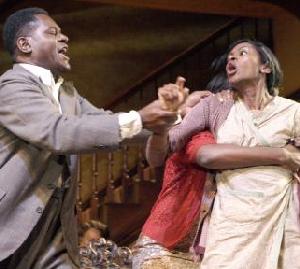SITE GUIDE
SEARCH
REVIEWS
FEATURES
NEWS
Etcetera and
Short Term Listings
LISTINGS
Broadway
Off-Broadway
NYC Restaurants
BOOKS and CDs
OTHER PLACES
Berkshires
London
California
New Jersey
DC
Philadelphia
Elsewhere
QUOTES
TKTS
PLAYWRIGHTS' ALBUMS
LETTERS TO EDITOR
FILM
LINKS
MISCELLANEOUS
Free Updates
Masthead
Writing for Us
A CurtainUp  London Review
London Review
 London Review
London ReviewBig White Fog
|
There’s nothing for a negro girl to look forward to.
---- Wanda |

Tony Armatrading as Daniel Rogers and Jenny Jules as Ella Mason
(Photo: Catherine Ashmore) |
Michael Attenborough has revived a black American play which has been in the doldrums for 70 years and never before played in Europe. Theodore Ward’s Big White Fog set in Chicago in the depression paints a picture of increasing hopelessness for a black family. It is a political play given an outstanding production with a stellar cast of some of the UK’s best actors.
The patriarchal figure Victor Mason (Danny Sapani) is a member of Marcus Garvey’s segregationist Back to Africa movement but the rest of his family remain unconvinced that this will be the solution to the family’s problems. Victor’s brother in law Danny Rogers (Tony Armatrading) rents out apartments and believes in the American Dream, that he will be able to succeed despite the racism of American society. Victor’s intelligent son Lester (Tunji Kasim) has won a scholarship on merit to a college which is withdrawn under the terms of the bequest when they realise that he is black. His sister Wanda (Gugu Mbatha-Raw) drops out of school to get a job in a drug store but ends up as the only person employed in the family. Jenny Jules plays Ella Mason, the mother trying to hold everything together. Her mamma, Martha Brooks (Novella Nelson) lives with them and celebrates the white part of her paternity, "I ain’t no African, I’m a Dupree" she says of the father that raped her mother. Wanda is driven to compromise the family’s moral standards and without her income they would starve.
The big white fog is the Chicago that black people found after the first world war when they moved north from the southern states. Theodore Ward’s father was born into slavery in Louisiana but became a schoolmaster who also sold patent medicines to supplement the family income and raise his eleven children. The problem for those who had migrated from the Southern states became getting work in the northern cities in order to pay the extortionate rent demanded of them. The play set is a detailed Edwardian living room set in one of those Blocks with its integral staircase, with dark wood and chintz fabrics dominating. The trumpet playing between scenes is evocative and soulful. The costumes and hair styles are beautifully reproduced and in keeping with this finely detailed period piece.
What makes this production worth seeing are the amazing performances of the cast, finely directed by Attenborough. Jenny Jules, in her role as the woman who, as money gets shorter and shorter, tries to save the furniture with a few dollars and becomes crazed with the strain of despair. This scene is so moving, I really thought I might cry. I liked too Gugu Mbatha-Raw as Wanda the pretty daughter whose solution to their desperate financial difficulties brings the condemnation of the whole family. Danny Sapani as Victor in the argument with his mother in law is memorable. But this ensemble cast all rise to the occasion with believable and creditable acting.
The rather clunky ending shows black and white people coming together through the organisation of the Communist Party to battle the bailiffs. We have lived through socialist experiments in Eastern Europe to know that they may not be the answer either but the play’s ending is uplifting if idealistic. As a historical study of the Depression, Theodore Ward’s play raises many of the issues that faced black families before, thankfully, more enlightened days.
|
BIG WHITE FOG
Written by Theodore Ward Directed by Michael Attenborough Starring: Danny Sapani, Jenny Jules, Gugu Mbatha-Raw, Novella Nelson, Tony Armatrading With: Tunji Kasim, Ayesha Antoine, Victor Nyambe, Kedar Williams-Stirling, Nathan Stewart-Jarrett, Tony Armatrading, Susan Salmon, Clint Dyer, Lenora Crichlow, Aaron Brown, Tony Turner, Al Matthews, Glynn Sweet, Martin Barron Design: Jonathan Fensom Lighting: Tim Mitchell Sound: John Leonard Music: Evan Jolly Running time: Two hours ten minutes with one interval Box Office: 020 7359 4404 Booking to 30th June 2007 Sponsored by Coutts Travel Sponsor: American Airlines Reviewed by Lizzie Loveridge based on 17th May 2007 performance at the Almeida, Almeida Street, Islington, London N1 (Tube: The Angel, Islington) |
|
London Theatre Tickets Lion King Tickets Billy Elliot Tickets Mary Poppins Tickets Mamma Mia Tickets We Will Rock You Tickets Theatre Tickets |




